
Jan 11, 2017 | Focolare Worldwide
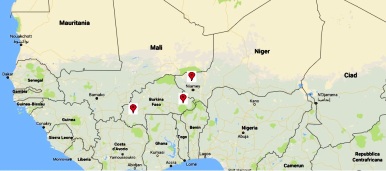 “We’ve just completed our journey that took us from Bobo-Dioulasso to Dorì, the most northern city of Burkina Faso; and then it was on to Niamey in Niger. The objective was to respond to the community that has gathered in the Focolare spirit to share experiences and the first fruits of life that have begun to spread in these lands of the Sahel.” This is how focolarini Aurora and Pascal from the focolare in Bobo Dioulasso begin their recount. Bobo Dioulasso is the second largest city in Burkina Faso and the headquarters of the local Focolare Movement . Burkina with its 17 million inhabitants (50% Muslim, 30% Christian and 20% traditional religions) is one of the poorest countries in the world, along with nearby Niger. “We reached Niamey, the capital of Niger, where we were welcomed with much joy by the community, including Archbishop Laurent Lompo who became a priest, he says, because of the first Mariapolis he attended. Archbishop Lompo is a real shepherd, close to his people and very concrete in his love. He shared with us his many experiences of friendship and dialogue with Muslims who make up 93% of the population of 10 million people. The relationship of the Christians with the Muslim world is a challenge, especially after January 17, 2015 when Islamist extremists burned more than 70 Christian churches following the Charlie Hebdo attacks in Paris.”
“We’ve just completed our journey that took us from Bobo-Dioulasso to Dorì, the most northern city of Burkina Faso; and then it was on to Niamey in Niger. The objective was to respond to the community that has gathered in the Focolare spirit to share experiences and the first fruits of life that have begun to spread in these lands of the Sahel.” This is how focolarini Aurora and Pascal from the focolare in Bobo Dioulasso begin their recount. Bobo Dioulasso is the second largest city in Burkina Faso and the headquarters of the local Focolare Movement . Burkina with its 17 million inhabitants (50% Muslim, 30% Christian and 20% traditional religions) is one of the poorest countries in the world, along with nearby Niger. “We reached Niamey, the capital of Niger, where we were welcomed with much joy by the community, including Archbishop Laurent Lompo who became a priest, he says, because of the first Mariapolis he attended. Archbishop Lompo is a real shepherd, close to his people and very concrete in his love. He shared with us his many experiences of friendship and dialogue with Muslims who make up 93% of the population of 10 million people. The relationship of the Christians with the Muslim world is a challenge, especially after January 17, 2015 when Islamist extremists burned more than 70 Christian churches following the Charlie Hebdo attacks in Paris.”  “Archbishop Lompo suggested that we also visit a woman in Hawa who had once attended Focolare events but now, for family reasons, had become a Muslim. Surprised and moved by our visit, she told us about her family and the beautiful hours together in the Mariapolis. When she heard that there would be another Mariapolis in the area, she promised that she would start preparig to be there. It was so beautiful to see in her and so many other Muslims that we met, their joy at being able to live in the City of Mary (Mariapolis) the experience of mutual love.” “Lastly, we visited a small community in Niamey; such deep people, desirous to live the Gospel and go forward in the experience of unity. Maybe our visit encouraged them on that path. One of them said to us in the name of everyone else: “It’s true that here in Africa we have to live so many difficult situations, but with the spirituality of Chiara Lubich we learn to love others, taking on their suffering and pain. How much I want this ideal of brotherhood to invade the Church and our country’s society!” Aurora De Oliveira and Pascal Pontien Ntawuyankira
“Archbishop Lompo suggested that we also visit a woman in Hawa who had once attended Focolare events but now, for family reasons, had become a Muslim. Surprised and moved by our visit, she told us about her family and the beautiful hours together in the Mariapolis. When she heard that there would be another Mariapolis in the area, she promised that she would start preparig to be there. It was so beautiful to see in her and so many other Muslims that we met, their joy at being able to live in the City of Mary (Mariapolis) the experience of mutual love.” “Lastly, we visited a small community in Niamey; such deep people, desirous to live the Gospel and go forward in the experience of unity. Maybe our visit encouraged them on that path. One of them said to us in the name of everyone else: “It’s true that here in Africa we have to live so many difficult situations, but with the spirituality of Chiara Lubich we learn to love others, taking on their suffering and pain. How much I want this ideal of brotherhood to invade the Church and our country’s society!” Aurora De Oliveira and Pascal Pontien Ntawuyankira
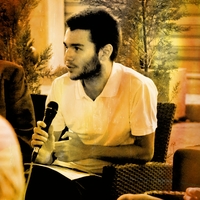
Jan 10, 2017 | Non categorizzato
 Piotr, what made you choose to enroll in Sophia? Many factors are involved. During high school I had the fortune to meet a philosopher from Turin by the name of Costanzo Preve, who introduced me to philosophical studies, an interest that arose from the attraction I felt for politics. His Hegelian-Marxist philosophical approach opened my eyes to social totality which likewise made the choice of my university studies very challenging; I could not make up my mind between economics, politics and philosophy. Towards the end of high school, a professor spoke to me about Sophia, even though it offered only Master’s courses. Finally, in order to have a diploma that would give me more job possibilities, I chose the three-year degree in economics in Genoa. But this choice was not really satisfactory… My dissatisfaction with the “mainstream” syllabus plans of many courses made me join the international network called “Rethinking Economics” to promote economic, methodological and interdisciplinary pluralism in the university methods of teaching economics, and the founding of a local seat for the network. Concurrently, and in an independent way, I continued my musical and philosophical studies. Besides, I had become a journalist and am part of the editorial staff of the paper “Termometro Politico” (Political Thermometre) and for some months now, direct the ecclesial debate magazine Grandsons of Maritain. In short, along the years I had read some essays of the Rector Piero Coda and had asked him if I could visit Sophia. I came twice, before enrolling. And every time my “Sophian” vocation became increasingly evident. What course have you decided to undertake and how have the first months in Sophia been? I chosen Trinitarian ontology, also because it gives me the chance to benefit from the agreement with Perugia University for the dual diploma, so as to achieve, besides that of the Vatican, also an Italian Master’s in philosophy specializing in didactics, which will, in the future give me the chance to teach in high schools. In these first months almost all of us have attended the same courses in philosophy, theology, politics and economics, which will enable us to start our studies on a common basis. This interdisciplinarity in my case, was not at all a surprise, but a conscious choice. From the academic viewpoint, Sophia’s level is very high and has given me the chance to deepen the course themes I am personally interested in. At the end of August I started to live in the residence, exactly two floors above the university facilities, together with 9 boys of all continents – from Argentina to China, from Germany to Tanzania, and across countries like the Lebanon. It is an excellent coexistence, well organized even in the housework: I immediately felt that we are brothers, in our little daily concerns. How about your projects? I can’t say much about this, since at this moment, new paths are opening out before me; the medium-term objective is to obtain my degree, but for my thesis I am considering various themes, and as oftentimes occurs, probably none of these will be the definitive one. Later, I may consider a Doctorate, but time will tell. I would like however to carry on with my journalistic activities, and, from the employment point of view, I would not really mind teaching, or find a job in the publishing sector. I don’t really want to set any limits to the Spirit who could inspire me to take other paths. Source: IUS online
Piotr, what made you choose to enroll in Sophia? Many factors are involved. During high school I had the fortune to meet a philosopher from Turin by the name of Costanzo Preve, who introduced me to philosophical studies, an interest that arose from the attraction I felt for politics. His Hegelian-Marxist philosophical approach opened my eyes to social totality which likewise made the choice of my university studies very challenging; I could not make up my mind between economics, politics and philosophy. Towards the end of high school, a professor spoke to me about Sophia, even though it offered only Master’s courses. Finally, in order to have a diploma that would give me more job possibilities, I chose the three-year degree in economics in Genoa. But this choice was not really satisfactory… My dissatisfaction with the “mainstream” syllabus plans of many courses made me join the international network called “Rethinking Economics” to promote economic, methodological and interdisciplinary pluralism in the university methods of teaching economics, and the founding of a local seat for the network. Concurrently, and in an independent way, I continued my musical and philosophical studies. Besides, I had become a journalist and am part of the editorial staff of the paper “Termometro Politico” (Political Thermometre) and for some months now, direct the ecclesial debate magazine Grandsons of Maritain. In short, along the years I had read some essays of the Rector Piero Coda and had asked him if I could visit Sophia. I came twice, before enrolling. And every time my “Sophian” vocation became increasingly evident. What course have you decided to undertake and how have the first months in Sophia been? I chosen Trinitarian ontology, also because it gives me the chance to benefit from the agreement with Perugia University for the dual diploma, so as to achieve, besides that of the Vatican, also an Italian Master’s in philosophy specializing in didactics, which will, in the future give me the chance to teach in high schools. In these first months almost all of us have attended the same courses in philosophy, theology, politics and economics, which will enable us to start our studies on a common basis. This interdisciplinarity in my case, was not at all a surprise, but a conscious choice. From the academic viewpoint, Sophia’s level is very high and has given me the chance to deepen the course themes I am personally interested in. At the end of August I started to live in the residence, exactly two floors above the university facilities, together with 9 boys of all continents – from Argentina to China, from Germany to Tanzania, and across countries like the Lebanon. It is an excellent coexistence, well organized even in the housework: I immediately felt that we are brothers, in our little daily concerns. How about your projects? I can’t say much about this, since at this moment, new paths are opening out before me; the medium-term objective is to obtain my degree, but for my thesis I am considering various themes, and as oftentimes occurs, probably none of these will be the definitive one. Later, I may consider a Doctorate, but time will tell. I would like however to carry on with my journalistic activities, and, from the employment point of view, I would not really mind teaching, or find a job in the publishing sector. I don’t really want to set any limits to the Spirit who could inspire me to take other paths. Source: IUS online
Jan 9, 2017 | Non categorizzato
https://vimeo.com/192601012 Copyright 2016 © CSC Audiovisivi – All rights reserved
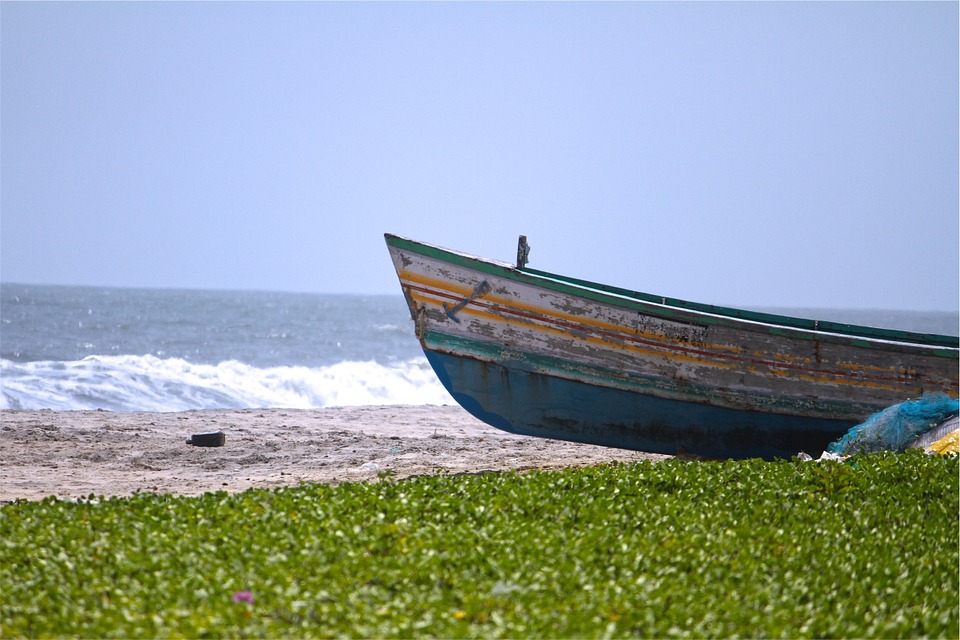
Jan 8, 2017 | Senza categoria
 Migrants We watched the first disembarkations in our cities. Today the initial receptions were moved to the courtyard in front of the municipal gym next to our home, and so from my balcony I could watch the long lines of migrants with bare feet or in singlets and shorts, waiting to pass through the first checkpoint. Suddenly it became very windy and the temperature dropped. I could no longer stand still. I had to do something for these brothers already harshly put to the test. I went out and noted an acquaintance among the members of the surveillance team, and learned from him that they were short of clothing. I returned home, and with my husband, put together what we thought could be useful, and after a few trips, delivered all to his friend, to be distributed. Also other acquaintances who we had notified, added other clothing. It had started to rain, but almost all had now received some clothing. Many smiled at us saying “grazie” (thank you in Italian), perhaps one of the few words they knew. Raffaella (Italy) Fund gathering When I found out that the father of a big and poor family needed an urgent operation but did not have the means to pay for it, I felt Jesus was prodding me to do something. With some friends, I made the effort to start raising funds, involving also our colleagues at work. Once I gathered the necessary amount, I accompanied the sick man to the hospital, and paid for the relevant treatment. The operation was a success. I can’t say if the joy of that family was greater than ours. I think that also small gestures contribute to building peace. N. Y. (Jordan) Neighbours The neighbour in front of our house was sick and needed many treatments. Her husband had gone on pension ahead of time to take care of her. My husband and I felt we had to do something and became their friends. While conversing with them one day, we ended up talking about our faith. We found out that she had stopped going to Church due to the incorrect behaviour of some priests; the husband instead, did not have much time for anything else due to work. When I recounted how God had come into my life, my neighbor started to ask many questions, and deduced that perhaps, illness itself could be a bridge that God was offering to her, as a means to move away from the heavy and sad atmosphere reigning in that house. She also started to give more care more to her looks. One evening her husband confided: «There is no medicine that can give serenity, and for some time now we are exploiting this asset». L. M. (France) BY: Oreste Paliotti
Migrants We watched the first disembarkations in our cities. Today the initial receptions were moved to the courtyard in front of the municipal gym next to our home, and so from my balcony I could watch the long lines of migrants with bare feet or in singlets and shorts, waiting to pass through the first checkpoint. Suddenly it became very windy and the temperature dropped. I could no longer stand still. I had to do something for these brothers already harshly put to the test. I went out and noted an acquaintance among the members of the surveillance team, and learned from him that they were short of clothing. I returned home, and with my husband, put together what we thought could be useful, and after a few trips, delivered all to his friend, to be distributed. Also other acquaintances who we had notified, added other clothing. It had started to rain, but almost all had now received some clothing. Many smiled at us saying “grazie” (thank you in Italian), perhaps one of the few words they knew. Raffaella (Italy) Fund gathering When I found out that the father of a big and poor family needed an urgent operation but did not have the means to pay for it, I felt Jesus was prodding me to do something. With some friends, I made the effort to start raising funds, involving also our colleagues at work. Once I gathered the necessary amount, I accompanied the sick man to the hospital, and paid for the relevant treatment. The operation was a success. I can’t say if the joy of that family was greater than ours. I think that also small gestures contribute to building peace. N. Y. (Jordan) Neighbours The neighbour in front of our house was sick and needed many treatments. Her husband had gone on pension ahead of time to take care of her. My husband and I felt we had to do something and became their friends. While conversing with them one day, we ended up talking about our faith. We found out that she had stopped going to Church due to the incorrect behaviour of some priests; the husband instead, did not have much time for anything else due to work. When I recounted how God had come into my life, my neighbor started to ask many questions, and deduced that perhaps, illness itself could be a bridge that God was offering to her, as a means to move away from the heavy and sad atmosphere reigning in that house. She also started to give more care more to her looks. One evening her husband confided: «There is no medicine that can give serenity, and for some time now we are exploiting this asset». L. M. (France) BY: Oreste Paliotti
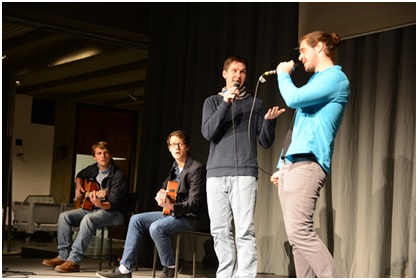
Jan 7, 2017 | Focolare Worldwide, Senza categoria
 An enriching evening of classical, dance, pop, contemplative, jazz, a musical and a buffet. The fourth edition of the benefit concert was promoted by the Focolare’s Youth for a United World in Vienna and by young people from Mor Efrem of the Syro-Orthodox community. Two hundred people showed up in spite of the freezing night temperatures of December, to support Syrian refugees. The “Singing Voices Choir” comprised of young people that included some Spanish speakers wished everyone a “Feliz Navidad” with song and dance. David Watzl presented Aktion Weitblick, a project that offers aid to refugees inside Europe and on its borders. He had spent two weeks at a refugee camp in Turkey where, with a group of volunteers from Aktion Weitblick, he organized afternoon games for children, classes in hygiene and many other activities. The Ishtar Syrian Dance Group brought the concert to a close with lively eastern dance that got the whole audience moving. Afterwards, a tasty buffet provided an opportunity for actors, visitors and refugees to mingle and know one another, and to plan future projects. The evening ended in a warm and fraternal atmosphere. Compiled by Young for Unity, Vienna, Austria
An enriching evening of classical, dance, pop, contemplative, jazz, a musical and a buffet. The fourth edition of the benefit concert was promoted by the Focolare’s Youth for a United World in Vienna and by young people from Mor Efrem of the Syro-Orthodox community. Two hundred people showed up in spite of the freezing night temperatures of December, to support Syrian refugees. The “Singing Voices Choir” comprised of young people that included some Spanish speakers wished everyone a “Feliz Navidad” with song and dance. David Watzl presented Aktion Weitblick, a project that offers aid to refugees inside Europe and on its borders. He had spent two weeks at a refugee camp in Turkey where, with a group of volunteers from Aktion Weitblick, he organized afternoon games for children, classes in hygiene and many other activities. The Ishtar Syrian Dance Group brought the concert to a close with lively eastern dance that got the whole audience moving. Afterwards, a tasty buffet provided an opportunity for actors, visitors and refugees to mingle and know one another, and to plan future projects. The evening ended in a warm and fraternal atmosphere. Compiled by Young for Unity, Vienna, Austria
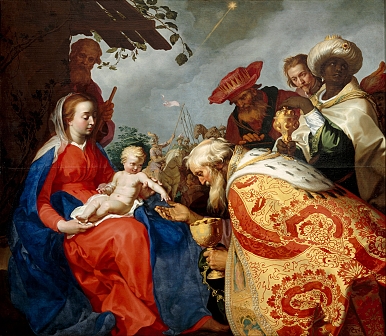
Jan 6, 2017 | Non categorizzato
 “Lord, this Christmas we entrust to You all the ones who seem far from You, the many who were once close to you but no longer are because of all the evils in the world that have taken them away from You. They don’t know You, but search for You with pure and sincere hearts. They don’t know that one day, one sweet day, You appeared on this earth as a baby. This Christmas, Lord, we entrust to You especially the ones without faith. We entrust them to You so that a ray of your Light might make its way to them, that because of their sincerity and good will the star that leads to You might shine at least for a moment so that they too will know the joy of those who acknowledge and love You. We entrust to You those who seem far from You, Lord, because we know that it was especially for these that You became a child.” Chiara Lubich, E torna Natale …, (Rome: Città Nuova, 2007), p. 59-60.
“Lord, this Christmas we entrust to You all the ones who seem far from You, the many who were once close to you but no longer are because of all the evils in the world that have taken them away from You. They don’t know You, but search for You with pure and sincere hearts. They don’t know that one day, one sweet day, You appeared on this earth as a baby. This Christmas, Lord, we entrust to You especially the ones without faith. We entrust them to You so that a ray of your Light might make its way to them, that because of their sincerity and good will the star that leads to You might shine at least for a moment so that they too will know the joy of those who acknowledge and love You. We entrust to You those who seem far from You, Lord, because we know that it was especially for these that You became a child.” Chiara Lubich, E torna Natale …, (Rome: Città Nuova, 2007), p. 59-60.

Jan 5, 2017 | Non categorizzato
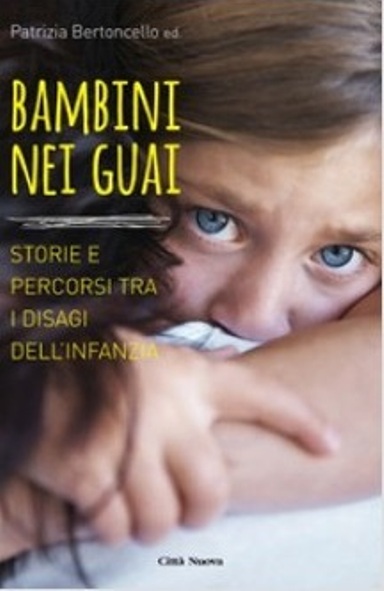 “A long stint as a primary school teacher – book curator, Patrizia Bertoncello, starts – soon led me to perceive those typical signs of distress which are more present in the peripheries than elsewhere. Often the children themselves talked about it. “Once upon a time there was a flower – Cristina, seven years old, wrote in class – her daddy-flower had left them and also mother-flower was not with him since she had so much to do and was very worried. She didn’t have time to listen to him. The flower was a rose with a thousand thorns. There were so many and pricked so much. The flower wanted to befriend the insects of the woods and the other flowers. But when they came close they got pricked so hard and ran away quickly, since she stung so much. And nothing could be done about it. In the end the rose was always alone and very sad.”(1) This is the lucid explanation she herself gave for those repeated pranks in class which isolated her from everyone. Like her, but with different problems, were the numerous children in distress, even in a world like ours that seems to be livable and protective, but not without contradictions and ambivalences weighing on the weaker sections of humanity. At times those institutions which in words advocate the rights of children, in fact, do little about it. Especially those children who cannot count on effective parents or long-lasting family relations are thus left in a sort of shadow zone, affective instability and often lacerating poverty. The lack of protection and real growth opportunities are conditions that certainly are not worthy of a society like ours. This is why I often asked myself how I could give a voice to these “invisible children,” and contribute to the building of a culture of protection and total respect for infancy.
“A long stint as a primary school teacher – book curator, Patrizia Bertoncello, starts – soon led me to perceive those typical signs of distress which are more present in the peripheries than elsewhere. Often the children themselves talked about it. “Once upon a time there was a flower – Cristina, seven years old, wrote in class – her daddy-flower had left them and also mother-flower was not with him since she had so much to do and was very worried. She didn’t have time to listen to him. The flower was a rose with a thousand thorns. There were so many and pricked so much. The flower wanted to befriend the insects of the woods and the other flowers. But when they came close they got pricked so hard and ran away quickly, since she stung so much. And nothing could be done about it. In the end the rose was always alone and very sad.”(1) This is the lucid explanation she herself gave for those repeated pranks in class which isolated her from everyone. Like her, but with different problems, were the numerous children in distress, even in a world like ours that seems to be livable and protective, but not without contradictions and ambivalences weighing on the weaker sections of humanity. At times those institutions which in words advocate the rights of children, in fact, do little about it. Especially those children who cannot count on effective parents or long-lasting family relations are thus left in a sort of shadow zone, affective instability and often lacerating poverty. The lack of protection and real growth opportunities are conditions that certainly are not worthy of a society like ours. This is why I often asked myself how I could give a voice to these “invisible children,” and contribute to the building of a culture of protection and total respect for infancy. 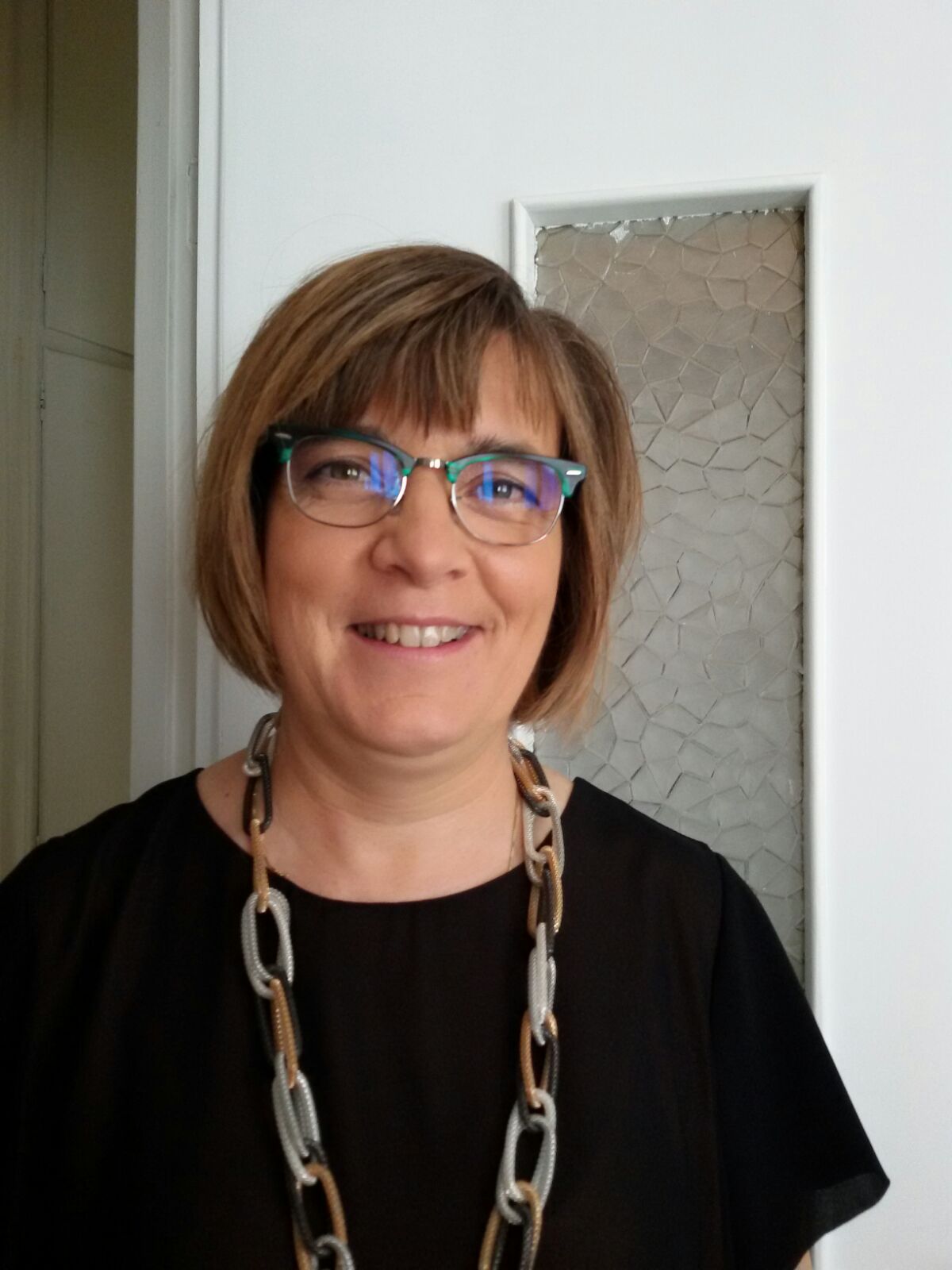 I started by trying to welcome some of my students with love, and slowly I saw that their tears dried up. I realised that to really “encounter” the world of the little ones, we have to approach each child with attention, and learn to see things through their eyes, making use of all our energies and skills to create important relationships. With other operators and professionals driven by the same educative style, I then tried to start up procedures in which the children and their families experience really educational relationships. From this cooperation the idea of a book came up, to narrate not only the stories of the “invisible children,” but also about good practices and redemptive pathways. “Children in Trouble,” said an oncologist, a social worker, a paediatrician and me, who curated the book, wants to bring out those seeds of hope and positive relations that become in some way, generators of resilience. Through that resource, many children when suitably aided are able to concretise and reach good recovery levels. The same happened to Emma. When she was eight years of age, overwhelmed by the split up of the family she had tried to commit suicide. Recently, after contacting me on Facebook, she wrote: “Dear teacher, how I miss you and the many moments we spent together! Do you remember when you read stories to us, taking on the voice of the characters? And the school trip to the sea? These will certainly never be erased from my heart and the love you showed me when all was dark around me. When I was in the hospital after the tragic event, you were there and didn’t ask me why I had done it. You were there, and that’s all. Then I returned to school with those wounds and you made everyone make those bracelets with coloured threads… but I knew that it was to help me hide those scars I didn’t want others to see…”(2) At the presentation of the book in universities and seminars, it was really surprising to see the attention and seriousness of the audience who started to take notice of that child next door, or the one who is begging in the subway or in a hospital ward. They were children who were invisible and now can return to being protagonists of their own future. By Anna Friso 1) – 2) – Patrizia Bertoncello – Bambini nei guai (Children in trouble) – Città Nuova Ed. 2015, p. 11 and p. 66
I started by trying to welcome some of my students with love, and slowly I saw that their tears dried up. I realised that to really “encounter” the world of the little ones, we have to approach each child with attention, and learn to see things through their eyes, making use of all our energies and skills to create important relationships. With other operators and professionals driven by the same educative style, I then tried to start up procedures in which the children and their families experience really educational relationships. From this cooperation the idea of a book came up, to narrate not only the stories of the “invisible children,” but also about good practices and redemptive pathways. “Children in Trouble,” said an oncologist, a social worker, a paediatrician and me, who curated the book, wants to bring out those seeds of hope and positive relations that become in some way, generators of resilience. Through that resource, many children when suitably aided are able to concretise and reach good recovery levels. The same happened to Emma. When she was eight years of age, overwhelmed by the split up of the family she had tried to commit suicide. Recently, after contacting me on Facebook, she wrote: “Dear teacher, how I miss you and the many moments we spent together! Do you remember when you read stories to us, taking on the voice of the characters? And the school trip to the sea? These will certainly never be erased from my heart and the love you showed me when all was dark around me. When I was in the hospital after the tragic event, you were there and didn’t ask me why I had done it. You were there, and that’s all. Then I returned to school with those wounds and you made everyone make those bracelets with coloured threads… but I knew that it was to help me hide those scars I didn’t want others to see…”(2) At the presentation of the book in universities and seminars, it was really surprising to see the attention and seriousness of the audience who started to take notice of that child next door, or the one who is begging in the subway or in a hospital ward. They were children who were invisible and now can return to being protagonists of their own future. By Anna Friso 1) – 2) – Patrizia Bertoncello – Bambini nei guai (Children in trouble) – Città Nuova Ed. 2015, p. 11 and p. 66
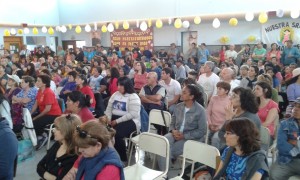
Jan 4, 2017 | Focolare Worldwide, Senza categoria
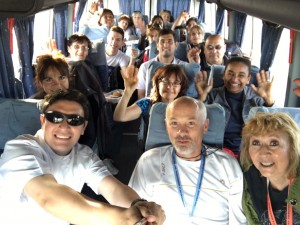 Per raggiungere Gan Gan, un villaggio che dista da Trelew poco più di 300 km, occorrono, bel tempo permettendo, 6/7 ore di viaggio. Si devono infatti affrontare i pendii della meseta di Chubut, che qui sono particolarmente impervi. In genere sono in pochi a visitare Gan Gan, che con i suoi 800 abitanti, a maggioranza indigeni mapuches e tehuelches, si è tristemente guadagnato la fama di “villaggio dimenticato da tutti”. Il 19 e 20 novembre scorso, proprio a Gan Gan si è tenuta una missione, con la partecipazione di persone venute da parrocchie e da realtà associative di Trelew. Durante il viaggio, la comitiva approfitta per rinsaldare la conoscenza reciproca e riflettere sul significato di questo spingersi verso i più poveri in risposta all’appello di papa Francesco. Ad attenderli, la festosa accoglienza della gente, con i suoi canti tipici, mentre un sacerdote li introduce nella realtà di questo tratto di altopiano dove sono ancora presenti miniere che vengono lavorate a cielo aperto, con gravi conseguenze per la contaminazione dell’ambiente. A fare gli onori di casa è un’anziana del villaggio, che nella sua lingua mapuche dà il benvenuto e presenta mons. Croxatto, vescovo ausiliare di Comodoro Rivadavia anch’egli venuto per la missione. Si inizia con la celebrazione di 5 battesimi. «Il sogno di uno di questi bambini, che ha già 4 anni – racconta una focolarina che fa parte della comitiva –, era di essere battezzato da papa Francesco. Il vescovo, ornato da tutti i paramenti, con grande amore gli spiega che il Papa è impossibilitato a venire fin quassù, ma che aveva conferito a lui il mandato di battezzarlo. Alla cerimonia è seguito un pranzo con cibo generosamente portato dalla gente e condiviso fra tutti». Poi i missionari iniziano a percorrere, in preghiera, l’intero villaggio: «Una processione che per gli scenari che si presentano ai nostri occhi – racconta un’altra focolarina presente – sembra una Via Crucis. La gente è disposta lungo la strada e racconta drammi di abbandono, solitudine, violenza, mancanza di giustizia: dalla mamma cui hanno ucciso il figlio, a quella il cui figlio è desaparecido, dalla poverissima casa di ricovero per anziani, alla cappella in desolante abbandono. Ciò che fa più impressione sono i volti della gente, anzitempo solcati da rughe di dolore e di stenti. Impressionante anche la quantità di persone che desiderano confessarsi. I sacerdoti ascoltano ininterrottamente le loro confessioni mentre la processione procede silenziosa. Altro momento forte è la messa della prima comunione con la cresima a 15 persone, alcune adulte e addirittura già nonne. A vedere come i sacerdoti si prodigano in questa realtà socialmente così lacerata, a come cercano di farsi vicini ai problemi della gente, tornano alla mente le parole di papa Francesco quando dice che i pastori debbono avere addosso l’odore delle loro pecore».
Per raggiungere Gan Gan, un villaggio che dista da Trelew poco più di 300 km, occorrono, bel tempo permettendo, 6/7 ore di viaggio. Si devono infatti affrontare i pendii della meseta di Chubut, che qui sono particolarmente impervi. In genere sono in pochi a visitare Gan Gan, che con i suoi 800 abitanti, a maggioranza indigeni mapuches e tehuelches, si è tristemente guadagnato la fama di “villaggio dimenticato da tutti”. Il 19 e 20 novembre scorso, proprio a Gan Gan si è tenuta una missione, con la partecipazione di persone venute da parrocchie e da realtà associative di Trelew. Durante il viaggio, la comitiva approfitta per rinsaldare la conoscenza reciproca e riflettere sul significato di questo spingersi verso i più poveri in risposta all’appello di papa Francesco. Ad attenderli, la festosa accoglienza della gente, con i suoi canti tipici, mentre un sacerdote li introduce nella realtà di questo tratto di altopiano dove sono ancora presenti miniere che vengono lavorate a cielo aperto, con gravi conseguenze per la contaminazione dell’ambiente. A fare gli onori di casa è un’anziana del villaggio, che nella sua lingua mapuche dà il benvenuto e presenta mons. Croxatto, vescovo ausiliare di Comodoro Rivadavia anch’egli venuto per la missione. Si inizia con la celebrazione di 5 battesimi. «Il sogno di uno di questi bambini, che ha già 4 anni – racconta una focolarina che fa parte della comitiva –, era di essere battezzato da papa Francesco. Il vescovo, ornato da tutti i paramenti, con grande amore gli spiega che il Papa è impossibilitato a venire fin quassù, ma che aveva conferito a lui il mandato di battezzarlo. Alla cerimonia è seguito un pranzo con cibo generosamente portato dalla gente e condiviso fra tutti». Poi i missionari iniziano a percorrere, in preghiera, l’intero villaggio: «Una processione che per gli scenari che si presentano ai nostri occhi – racconta un’altra focolarina presente – sembra una Via Crucis. La gente è disposta lungo la strada e racconta drammi di abbandono, solitudine, violenza, mancanza di giustizia: dalla mamma cui hanno ucciso il figlio, a quella il cui figlio è desaparecido, dalla poverissima casa di ricovero per anziani, alla cappella in desolante abbandono. Ciò che fa più impressione sono i volti della gente, anzitempo solcati da rughe di dolore e di stenti. Impressionante anche la quantità di persone che desiderano confessarsi. I sacerdoti ascoltano ininterrottamente le loro confessioni mentre la processione procede silenziosa. Altro momento forte è la messa della prima comunione con la cresima a 15 persone, alcune adulte e addirittura già nonne. A vedere come i sacerdoti si prodigano in questa realtà socialmente così lacerata, a come cercano di farsi vicini ai problemi della gente, tornano alla mente le parole di papa Francesco quando dice che i pastori debbono avere addosso l’odore delle loro pecore».  Nel viaggio di ritorno viene creato un gruppo whatsapp perché tutti vogliono che l’esperienza della missione non finisca qui. Molti dicono che a Gan Gan bisogna tornare, colpiti dall’esperienza forte e profonda di essersi sentiti – pastori e laici – un unico popolo di Dio. E per aver vissuto, insieme, l’esperienza di “uscire” come Chiesa per incontrare i più deboli. Toccante l’esperienza condivisa da uno dei sacerdoti che durante il pranzo comunitario era andato a far visita ai parenti di una signora di Trelew nativa di Gan Gan. «L’impatto è stato molto forte – racconta –. Erano due fratelli di 83 e 81 anni ambedue sordi: la signora al 90% e il fratello, non vedente al 100%. Vivono in una stanza di due metri per due, con i due letti disposti a L. La porta è quasi inesistente e il pavimento di nuda terra. Il freddo che entra dalla porta e quello che affiora dal pavimento, non fa che accentuare l’artrosi di cui soffre la donna. Nel cuore mi è rimasta una ferita. Penso che la missione, che pure è andata bene, non avrebbe senso se non facciamo qualcosa per dare dignità a questi indigenti». Alla sera già arrivano le prime risposte via whatsapp al parroco: «Abbiamo trovato i soldi per rifare la porta. Mandaci le misure». Fonte: Focolares Cono Sur online
Nel viaggio di ritorno viene creato un gruppo whatsapp perché tutti vogliono che l’esperienza della missione non finisca qui. Molti dicono che a Gan Gan bisogna tornare, colpiti dall’esperienza forte e profonda di essersi sentiti – pastori e laici – un unico popolo di Dio. E per aver vissuto, insieme, l’esperienza di “uscire” come Chiesa per incontrare i più deboli. Toccante l’esperienza condivisa da uno dei sacerdoti che durante il pranzo comunitario era andato a far visita ai parenti di una signora di Trelew nativa di Gan Gan. «L’impatto è stato molto forte – racconta –. Erano due fratelli di 83 e 81 anni ambedue sordi: la signora al 90% e il fratello, non vedente al 100%. Vivono in una stanza di due metri per due, con i due letti disposti a L. La porta è quasi inesistente e il pavimento di nuda terra. Il freddo che entra dalla porta e quello che affiora dal pavimento, non fa che accentuare l’artrosi di cui soffre la donna. Nel cuore mi è rimasta una ferita. Penso che la missione, che pure è andata bene, non avrebbe senso se non facciamo qualcosa per dare dignità a questi indigenti». Alla sera già arrivano le prime risposte via whatsapp al parroco: «Abbiamo trovato i soldi per rifare la porta. Mandaci le misure». Fonte: Focolares Cono Sur online
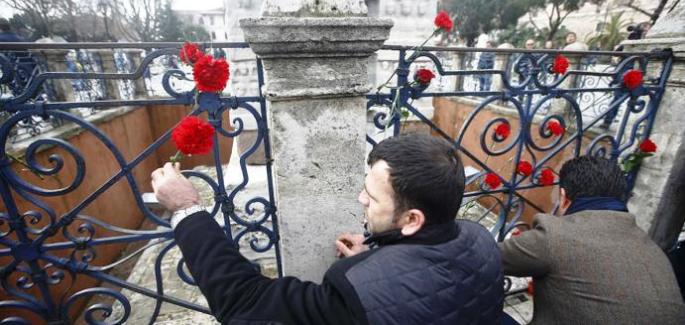
Jan 2, 2017 | Non categorizzato
«I woke up this morning, 1 January, ready to live this day and year which was just dawning – wrote a friend from Istanbul – and the first news that hit me was that of the attack in the Reina Club Disco in the night. The immediate sense of pain and bewilderment: It can’t be true!!! After a few hours I read the word of life of the month: “If we have really experienced His love, we cannot but love in turn, and step in with courage, wherever there is division, conflict, hatred, so as to bring harmony, peace and unity. Love enables us to launch our hearts beyond the obstacle….” This is precisely said for me, for us, who want to continue believing and live for universal peace and brotherhood. The wishes we exchanged during the day with many friends are pervaded with a mixture of discouragement and hope. No! We will not allow ourselves to be overcome by those who want to make us think that peace is a utopia. And from all over the world, many people make us feel that we are not alone». And it is really true: they are not alone. Though bewildered for the enactment of so much unjust violence, we are in fact, not alone in facing the challenge to work each day for the advent of peace. We want to respond to the appeal of Pope Francis, expressed in his message for the World Peace Day we have just celebrated: «In2017, let us undertake the commitment, with prayer and action, to become people who have banned violence from their hearts, words and gestures, and build non-violent communities that take care of our common home».
from Istanbul – and the first news that hit me was that of the attack in the Reina Club Disco in the night. The immediate sense of pain and bewilderment: It can’t be true!!! After a few hours I read the word of life of the month: “If we have really experienced His love, we cannot but love in turn, and step in with courage, wherever there is division, conflict, hatred, so as to bring harmony, peace and unity. Love enables us to launch our hearts beyond the obstacle….” This is precisely said for me, for us, who want to continue believing and live for universal peace and brotherhood. The wishes we exchanged during the day with many friends are pervaded with a mixture of discouragement and hope. No! We will not allow ourselves to be overcome by those who want to make us think that peace is a utopia. And from all over the world, many people make us feel that we are not alone». And it is really true: they are not alone. Though bewildered for the enactment of so much unjust violence, we are in fact, not alone in facing the challenge to work each day for the advent of peace. We want to respond to the appeal of Pope Francis, expressed in his message for the World Peace Day we have just celebrated: «In2017, let us undertake the commitment, with prayer and action, to become people who have banned violence from their hearts, words and gestures, and build non-violent communities that take care of our common home».
Jan 2, 2017 | Non categorizzato
https://vimeo.com/196291342 (Copyright 2016 © CSC Audiovisivi – All rights reserved)

 “We’ve just completed our journey that took us from Bobo-Dioulasso to Dorì, the most northern city of Burkina Faso; and then it was on to Niamey in Niger. The objective was to respond to the community that has gathered in the Focolare spirit to share experiences and the first fruits of life that have begun to spread in these lands of the Sahel.” This is how focolarini Aurora and Pascal from the focolare in Bobo Dioulasso begin their recount. Bobo Dioulasso is the second largest city in Burkina Faso and the headquarters of the local Focolare Movement . Burkina with its 17 million inhabitants (50% Muslim, 30% Christian and 20% traditional religions) is one of the poorest countries in the world, along with nearby Niger. “We reached Niamey, the capital of Niger, where we were welcomed with much joy by the community, including Archbishop Laurent Lompo who became a priest, he says, because of the first Mariapolis he attended. Archbishop Lompo is a real shepherd, close to his people and very concrete in his love. He shared with us his many experiences of friendship and dialogue with Muslims who make up 93% of the population of 10 million people. The relationship of the Christians with the Muslim world is a challenge, especially after January 17, 2015 when Islamist extremists burned more than 70 Christian churches following the Charlie Hebdo attacks in Paris.”
“We’ve just completed our journey that took us from Bobo-Dioulasso to Dorì, the most northern city of Burkina Faso; and then it was on to Niamey in Niger. The objective was to respond to the community that has gathered in the Focolare spirit to share experiences and the first fruits of life that have begun to spread in these lands of the Sahel.” This is how focolarini Aurora and Pascal from the focolare in Bobo Dioulasso begin their recount. Bobo Dioulasso is the second largest city in Burkina Faso and the headquarters of the local Focolare Movement . Burkina with its 17 million inhabitants (50% Muslim, 30% Christian and 20% traditional religions) is one of the poorest countries in the world, along with nearby Niger. “We reached Niamey, the capital of Niger, where we were welcomed with much joy by the community, including Archbishop Laurent Lompo who became a priest, he says, because of the first Mariapolis he attended. Archbishop Lompo is a real shepherd, close to his people and very concrete in his love. He shared with us his many experiences of friendship and dialogue with Muslims who make up 93% of the population of 10 million people. The relationship of the Christians with the Muslim world is a challenge, especially after January 17, 2015 when Islamist extremists burned more than 70 Christian churches following the Charlie Hebdo attacks in Paris.”  “Archbishop Lompo suggested that we also visit a woman in Hawa who had once attended Focolare events but now, for family reasons, had become a Muslim. Surprised and moved by our visit, she told us about her family and the beautiful hours together in the Mariapolis. When she heard that there would be another Mariapolis in the area, she promised that she would start preparig to be there. It was so beautiful to see in her and so many other Muslims that we met, their joy at being able to live in the City of Mary (Mariapolis) the experience of mutual love.” “Lastly, we visited a small community in Niamey; such deep people, desirous to live the Gospel and go forward in the experience of unity. Maybe our visit encouraged them on that path. One of them said to us in the name of everyone else: “It’s true that here in Africa we have to live so many difficult situations, but with the spirituality of Chiara Lubich we learn to love others, taking on their suffering and pain. How much I want this ideal of brotherhood to invade the Church and our country’s society!” Aurora De Oliveira and Pascal Pontien Ntawuyankira
“Archbishop Lompo suggested that we also visit a woman in Hawa who had once attended Focolare events but now, for family reasons, had become a Muslim. Surprised and moved by our visit, she told us about her family and the beautiful hours together in the Mariapolis. When she heard that there would be another Mariapolis in the area, she promised that she would start preparig to be there. It was so beautiful to see in her and so many other Muslims that we met, their joy at being able to live in the City of Mary (Mariapolis) the experience of mutual love.” “Lastly, we visited a small community in Niamey; such deep people, desirous to live the Gospel and go forward in the experience of unity. Maybe our visit encouraged them on that path. One of them said to us in the name of everyone else: “It’s true that here in Africa we have to live so many difficult situations, but with the spirituality of Chiara Lubich we learn to love others, taking on their suffering and pain. How much I want this ideal of brotherhood to invade the Church and our country’s society!” Aurora De Oliveira and Pascal Pontien Ntawuyankira






 I started by trying to welcome some of my students with love, and slowly I saw that their tears dried up. I realised that to really “encounter” the world of the little ones, we have to approach each child with attention, and learn to see things through their eyes, making use of all our energies and skills to create important relationships. With other operators and professionals driven by the same educative style, I then tried to start up procedures in which the children and their families experience really educational relationships. From this cooperation the idea of a book came up, to narrate not only the stories of the “invisible children,” but also about good practices and redemptive pathways. “Children in Trouble,” said an oncologist, a social worker, a paediatrician and me, who curated the book, wants to bring out those seeds of hope and positive relations that become in some way, generators of resilience. Through that resource, many children when suitably aided are able to concretise and reach good recovery levels. The same happened to Emma. When she was eight years of age, overwhelmed by the split up of the family she had tried to commit suicide. Recently, after contacting me on Facebook, she wrote: “Dear teacher, how I miss you and the many moments we spent together! Do you remember when you read stories to us, taking on the voice of the characters? And the school trip to the sea? These will certainly never be erased from my heart and the love you showed me when all was dark around me. When I was in the hospital after the tragic event, you were there and didn’t ask me why I had done it. You were there, and that’s all. Then I returned to school with those wounds and you made everyone make those bracelets with coloured threads… but I knew that it was to help me hide those scars I didn’t want others to see…”(2) At the presentation of the book in universities and seminars, it was really surprising to see the attention and seriousness of the audience who started to take notice of that child next door, or the one who is begging in the subway or in a hospital ward. They were children who were invisible and now can return to being protagonists of their own future. By Anna Friso 1) – 2) – Patrizia Bertoncello – Bambini nei guai (
I started by trying to welcome some of my students with love, and slowly I saw that their tears dried up. I realised that to really “encounter” the world of the little ones, we have to approach each child with attention, and learn to see things through their eyes, making use of all our energies and skills to create important relationships. With other operators and professionals driven by the same educative style, I then tried to start up procedures in which the children and their families experience really educational relationships. From this cooperation the idea of a book came up, to narrate not only the stories of the “invisible children,” but also about good practices and redemptive pathways. “Children in Trouble,” said an oncologist, a social worker, a paediatrician and me, who curated the book, wants to bring out those seeds of hope and positive relations that become in some way, generators of resilience. Through that resource, many children when suitably aided are able to concretise and reach good recovery levels. The same happened to Emma. When she was eight years of age, overwhelmed by the split up of the family she had tried to commit suicide. Recently, after contacting me on Facebook, she wrote: “Dear teacher, how I miss you and the many moments we spent together! Do you remember when you read stories to us, taking on the voice of the characters? And the school trip to the sea? These will certainly never be erased from my heart and the love you showed me when all was dark around me. When I was in the hospital after the tragic event, you were there and didn’t ask me why I had done it. You were there, and that’s all. Then I returned to school with those wounds and you made everyone make those bracelets with coloured threads… but I knew that it was to help me hide those scars I didn’t want others to see…”(2) At the presentation of the book in universities and seminars, it was really surprising to see the attention and seriousness of the audience who started to take notice of that child next door, or the one who is begging in the subway or in a hospital ward. They were children who were invisible and now can return to being protagonists of their own future. By Anna Friso 1) – 2) – Patrizia Bertoncello – Bambini nei guai (

